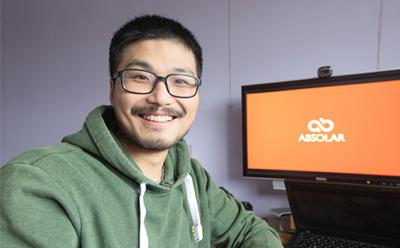Space data and remote sensing blended to target net-zero emissions in buildings

A sustainable engineering collaboration with the University of Southampton is enhancing cutting-edge software that analyses buildings’ energy performance and helps develop plans to achieve net-zero carbon emissions.
Absolar, founded by sustainable energy engineer Dr Phil Wu, has received funding from the UK Space Agency to collaborate with University research software engineers on a Carbon Action Planning Tool (CAPT).
The software integrates satellite images, solar radiation and LiDAR with other data sources to provide organisations with a clear view of financial and CO2 performance in buildings at property or portfolio level.
The technology used in CAPT has already been adopted by Southampton City Council and Portsmouth City Council.
Dr Wu, from the Sustainable Energy Research Group, says: “We are thrilled to have received support from the UK Space Agency and to collaborate with the University’s Research Software Engineers. The support and collaboration will ultimately mean organisations benefit from an enhanced step-by-step understanding to achieve net-zero carbon emissions across their property portfolios and save energy costs at the same time.”
The funding is one of five investments announced by the national Space Research and Innovation Network for Technology (SPRINT).
Science Minister Amanda Solloway says: “The UK’s space sector is flourishing and it is vital we give our most innovative space businesses and universities the right support to collaborate, share best practice and drive forward new ideas that could help enrich all our lives.
“Today’s funding will provide lift off to some of the country’s most ambitious space collaborations, accelerating potentially game-changing technologies that will help the UK respond to global challenges such as cutting carbon emissions.”
One of the projects, involving the University of Southampton’s Iris Kramer, will use space archaeology and Earth Observation data to help the construction industry by spotting likely sites for archaeology.
The start-up business, ArchAI, is saving people and businesses money when acquiring planning permission by significantly lowering the risk of construction inadvertently beginning on a burial site.
Iris Kramer, CEO of ArchAI, says: “This project will help us increase the training data of known archaeological sites and validate our AI across the country to detect unknown sites. We’ll also be able to improve our solution on satellite imagery which will help us scale globally.”
Both Absolar and ArchAI exhibited at CES 2021 this month through Future Worlds, the on-campus start-up accelerator at the University of Southampton.
Absolar launched their cutting edge software, INTERA, at CES. People can experience a demonstration of the software on the Absolar website.